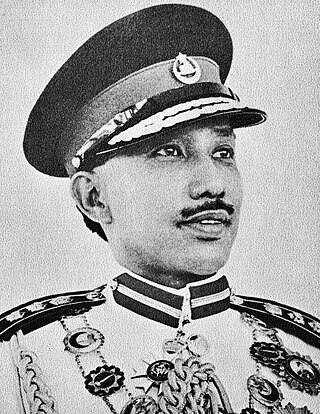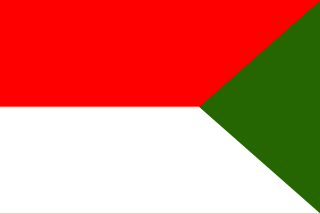The history of Brunei concerns the settlements and societies located on the north coast of the island of Borneo, which has been under the influence of Indianised kingdoms and empires for much of its history. Local scholars assume that the Islamisation of Brunei started in the fifteenth century with the formation of the Bruneian Empire, a thalassocracy that covered the northern part of Borneo and Sulu. At the end of the 17th century, Brunei subsequently entered a period of decline brought on by the Brunei Civil War, piracy, and European colonial expansion. Later, there was a brief war with Spain, in which Brunei evacuated its capital for a brief period until the Spanish withdrew. The empire lost much of its territory with the arrival of the Western powers, such as the Spanish in Luzon and Visayas and the British in Labuan, Sarawak, and North Borneo. The decline of the Bruneian Empire accelerated in the nineteenth century when Brunei gave much of its territory to the White Rajahs of Sarawak, resulting in its current small landmass and separation into two parts. Sultan Hashim Jalilul Alam Aqamaddin later appealed to the British to stop further annexation in 1888. In the same year, the British signed a "Treaty of Protection" and made Brunei a British protectorate until 1984 when it gained independence and prospered due to the discovery of oil.

Mohamed Bolkiah ibni Omar Ali Saifuddien III is a member of the royal family of Brunei. He is the second son of Omar Ali Saifuddien III, the 28th Sultan of Brunei, and Raja Isteri (Queen) Pengiran Anak Damit. After Brunei's independence in 1984, he became the country’s first foreign minister, serving from 1 January 1984 until 22 October 2015, alongside the second Minister of Foreign Affairs and Trade, Lim Jock Seng.

Omar Ali Saifuddien Sa'adul Khairi Waddien was the 28th Sultan of Brunei, reigning from 1950 until his abdication in 1967 to his oldest son, Hassanal Bolkiah.

Omar Ali Saifuddin II was the 23rd Sultan of Brunei. During his reign, Western powers such as the United Kingdom and the United States visited the country. His reign saw the British adventurer James Brooke becoming the White Rajah of Sarawak.
Omar Ali Saifuddin I ibni Muhammad Alauddin, also known as Al-Marhum Makam Besar, was the 18th Sultan of Brunei and the second son of Sultan Muhammad Alauddin. He was regarded as one of the longest-serving sultans and was renowned for his wise leadership and just rule, merely following his father-in-law, Sultan Hussin Kamaluddin. In fact, he received helpful knowledge, counsel, and experience from his father-in-law when he was still alive during his reigning period.

Malcolm John MacDonald was a British politician and diplomat. He was initially a Labour Member of Parliament (MP), but in 1931 followed his father Ramsay MacDonald in breaking with the party and joining the National Government. He was consequently expelled from the Labour Party. He was a government minister during the Second World War and was later Governor of Kenya.

Muhammad Jamalul Alam II was the 26th Sultan of Brunei from 1906 until his death in 1924. He was succeeded by his eldest son Sultan Ahmad Tajuddin.

Bendahara was an administrative position within classical Malay kingdoms comparable to a vizier before the intervention of European powers during the 19th century. A bendahara was appointed by a sultan and was a hereditary post. The bendahara and the sultan shared the same lineage.

The Brunei revolt or the Brunei rebellion of 1962 was a December 1962 insurrection in the British protectorate of Brunei by opponents of its monarchy and its proposed inclusion in the Federation of Malaysia who wanted to establish a republic. The insurgents were members of the TNKU, a militia supplied by Indonesia and linked to the left-wing Brunei People's Party (BPP), which favoured a North Borneo Federation. The TNKU began co-ordinated attacks on the oil town of Seria, on police stations, and on government facilities around the protectorate. The revolt began to break down within hours, having failed to achieve key objectives such as the capture of Brunei Town and Sultan Omar Ali Saifuddien III. The revolt influenced the Sultan's 1963 decision not to join Malaysia. It is seen as one of the first stages of the Indonesia–Malaysia confrontation.

Sheikh Ahmad M. Azahari bin Sheikh Mahmud, better known as A. M. Azahari, was a Bruneian politician, businessman and nationalist of Arab descent who fought against Dutch colonialism in the Dutch East Indies, the chairman of the Parti Rakyat Brunei from 1947 to 1962, and the Prime Minister of the North Borneo Federation in 1962.

Abdul Momin ibni Abdul Wahab was the 24th Sultan of Brunei from 1852 until his death in 1885.

Brunei People's Party (BPR), also known as Parti Rakyat Brunei (PRB), is a banned political party in Brunei. The party was established as a left-wing party in 1956 and aimed to bring Brunei into full independence from the United Kingdom. The party called for a constitution that would unite Brunei, North Borneo, and Sarawak under a fully democratic government, the Unitary State of North Kalimantan or Negara Kesatuan Kalimantan Utara (NKKU). However, in 1958 the British publicised their own ideas and rejected the Borneo union ambitions of the PRB, seeking instead for a gradual democratic transformation. The PRB's reactions to both the plan for a Federation of Malaysia and the Constitution of Brunei led to a mutiny in the first part of December 1962.

Hashim Jalilul Alam Aqamaddin was the 25th Sultan of Brunei from 1885 to 1906. Pengiran Anak Hashim or Hashim Jalilul was a prominent and controversial figure in Bruneian history. Many Western visitors' narrative painted him and his surroundings in a bad light, which was consistent with the idea that Brunei was a decaying monarchy at the time.

The Omar Ali Saifuddien Mosque or unofficially Sultan Omar Ali Saifuddin Mosque, is a mosque in Bandar Seri Begawan, the capital of Brunei. Omar Ali Saifuddien III, the 28th Sultan of Brunei, is credited with building the mosque, thus its name. It is one of the two state mosques, the other Jame' Asr Hassanil Bolkiah Mosque. One of the biggest and most striking mosques in the Far East, it was completed in 1958 at a cost of $5 million USD. The Mughal architecture of India had a significant effect on the design.

Sultan Idris Education University is a public university in the town of Tanjung Malim, Perak in Malaysia. First established in 1922 as a teachers college, it is one of the oldest functioning institutions of higher learning in Malaysia.

Marsal bin Maun was a Bruneian politician and educator who served as the second Menteri Besar of Brunei from 1961 to 1962. His tenure was marked by the outbreak of the Brunei revolt in December 1962. Marsal played a pivotal role in establishing both the Brunei Malay Teachers Association (PGGMB) and the Brunei Scout Movement, which continue to thrive today. A prominent figure within the PGGMB, he was also closely associated with Sultan Omar Ali Saifuddien III. He was one of the "three M's" that concerned the British government, alongside Pengiran Muhammad Ali and Pengiran Muhammad Yusuf.

Ibrahim bin Mohammad Jahfar was an aristocrat and politician who became Brunei's first Menteri Besar, serving from 29 September 1959 to 1 August 1962. He played a key role in advising Sultan Omar Ali Saifuddien III on significant developments, including the National Development Plan and the drafting of Brunei's written constitution. Throughout his career, Ibrahim held several important positions, including private secretary to the Sultan, Speaker of the Legislative Council, member of the Privy Council, and Secretary of State to the British Resident.

Pengiran Muda Hashim was a Bruneian nobleman and politician who held several significant positions, including membership in the Privy Council, Legislative Council, and the Brunei Islamic Religious Council. As a member of the Bruneian royal family, he was the husband to Pengiran Anak Puteri (Princess) Besar, the daughter of Sultan Muhammad Jamalul Alam II. He was named Wazir in 1952 and served on the executive committee for the coronation ceremony of Sultan Hassanal Bolkiah, acting as Sultan during the late Sultan's foreign tours.

Pengiran Mohammad bin Pengiran Abdul Rahman Piut, commonly referred to by his title Pengiran Temenggong and nicknamed National Hero, was a Bruneian nobleman, teacher and politician who formerly held several high-ranking positions which included being a member of the State Council, Privy Council, and the Islamic Religious Council. Notably, he is one of the founding members of the Royal Brunei Yacht Club and the Chairman of the Brunei Boxing Association.

The Military of the Bruneian Sultanate was the land force of the Bruneian Sultanate from 1368 to 1888.


















